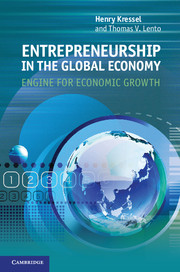Book contents
- Frontmatter
- Contents
- Figures
- Tables
- Acknowledgments
- Introduction
- 1 Government: Boss, financial partner, regulator – Entrepreneurs in mixed economies
- 2 Standing still is not an option: On promoting entrepreneurship and economic growth
- 3 Electronic innovation and the government: David Sarnoff creates the RCA empire
- 4 Global problem, golden opportunity: Ron Stanton profits from market disruption
- 5 Speeding voice and data traffic worldwide: Network microprocessors from RMI
- 6 A world leader emerges: SanDisk and flash memories
- 7 Implementing information technology across the globe
- 8 Three startups in China: Entrepreneurs in a controlled economy
- 9 Connecting the wireless networks of the world
- 10 Building an economy: Government planning vs. entrepreneurial innovation
- Select bibliography
- Index
1 - Government: Boss, financial partner, regulator – Entrepreneurs in mixed economies
Published online by Cambridge University Press: 05 August 2012
- Frontmatter
- Contents
- Figures
- Tables
- Acknowledgments
- Introduction
- 1 Government: Boss, financial partner, regulator – Entrepreneurs in mixed economies
- 2 Standing still is not an option: On promoting entrepreneurship and economic growth
- 3 Electronic innovation and the government: David Sarnoff creates the RCA empire
- 4 Global problem, golden opportunity: Ron Stanton profits from market disruption
- 5 Speeding voice and data traffic worldwide: Network microprocessors from RMI
- 6 A world leader emerges: SanDisk and flash memories
- 7 Implementing information technology across the globe
- 8 Three startups in China: Entrepreneurs in a controlled economy
- 9 Connecting the wireless networks of the world
- 10 Building an economy: Government planning vs. entrepreneurial innovation
- Select bibliography
- Index
Summary
Nothing has been more important since the beginning of my reign than increasing the prosperity of my people. The introduction of certain new manufacturing industries … enables thousands of my people to gain their bread honorably, the raw material stays in the country … and my subjects can easily pay their taxes. While previously money left the country, it now stays within, making the country richer and more populated.
Leopold I, Emperor of Austria (1640–1705)We quote Emperor Leopold here because his touching concern for his subjects’ welfare (and their ability to pay their taxes) communicates a clear message: the government needs to play a big role in expanding his country’s economy. Instead of issuing a proclamation encouraging local entrepreneurs to innovate, he instituted an active policy, backed by state funds, to create important new industries. The idea of depending solely on local entrepreneurs to build such industries would not have entered his head.
Leopold was neither the first nor, certainly, the last head of state to hold such views. Rulers of his era were well aware that building a country’s economic prosperity had the desirable side-effect of increasing its power in international affairs, and many acted on that realization. In the late 1600s Sir Walter Raleigh observed, “Whosoever commands the sea, commands the trade, whosoever commands the trade of the world commands the riches of the world and consequently the world itself.” As a result, the competitive race to industrialize and sustain national trade advantages was a constant source of international friction, sometimes leading to war.
- Type
- Chapter
- Information
- Entrepreneurship in the Global EconomyEngine for Economic Growth, pp. 11 - 34Publisher: Cambridge University PressPrint publication year: 2012



